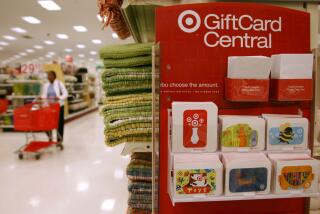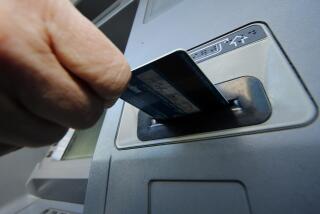Chit Chat : Prepaid Phone Cards Expected to Take Off
- Share via
Only a tiny fraction of the American public knows what they are, but telephone industry insiders are hitching their wagons to prepaid phone cards--a business that could easily exceed $1 billion annually by 1996.
Since the beginning of the year, the debit cards for long-distance calls have been launched by the millions. Issuers range from the big names in long-distance to banks and entertainment companies. And although using prepaid cards for calls has long been common in other countries, the business is in its infancy here.
“I am convinced that every grocery store, convenience store and gas station will be selling prepaid calling cards within the next 12 months,” says Terry Macko, director of Phone Cash marketing at MCI. “They are taking off as an entirely new retail category.”
What are prepaid phone cards?
They’re pieces of plastic that bear an 800 number and a personal identification number. By dialing the toll-free number and punching in your PIN, you can gain access to an “account” that entitles you to a set number of minutes of phone time. The amount of time you get--and the price of the calls--is set when you buy the card. The expiration of the time allotment varies by company: Some expire after several months, a year or not at all.
Some phone card companies also offer additional services--payable from your account--that range from faxes to phone sex.
With technological advances and growing competition, the cards’ promoters see advantages for everyone.
The phone companies like prepaid accounts because they don’t have to send you a bill or worry that you won’t pay. Non-phone companies can use them as advertising vehicles. For a few dollars a card, you can provide someone with a collectible bit of plastic that will deliver an advertising message every time it’s used or looked at.
Some users of long-distance services will like them because they’re sometimes cheaper than calling collect or using a phone credit card. Collectors like them because some are attractive, and the rarer cards can appreciate in value. One of the first cards ever issued in the United States--a promotional giveaway with $1 in phone time--recently sold for $1,700.
*
Generally, using the card accounts can be a bargain for people making short phone calls away from home--assuming they’d otherwise call collect or use a calling card. That’s because fees are minimal. But on longer calls, the prepaid calls often cost more. And calling direct from home will usually be cheaper.
But experts are beginning to voice concerns about the industry, which is largely unregulated. Some worry about con artists selling worthless card accounts, and they note that children can use them to get around “phone blocking” and other restrictions.
Moreover, because the cards can be purchased at supermarkets like lottery tickets or bread, buyers are largely anonymous. That could make the cards a convenient vehicle for criminals and other people--such as unfaithful spouses--who want to keep conversation records off their phone bills.
“It’s the vast new frontier,” says Barbara Esbin, assistant chief of the tariff division at the Federal Communications Commission, who spoke at a summer conference on prepaid cards. “As I looked out over the audience in June, it ranged from the Bell-heads to people you would expect to see selling watches on 42nd Street--and everybody in between.”
Of particular concern to regulators is fraud. Because consumers are buying calling time in advance, they are out of luck if the company disbands while they still have time in their accounts.
“There is a legitimate need and market for these cards, but at the same time there is a whole lot of opportunity for consumers to get hurt,” says Ron Choura, deputy director of policy at the Michigan Public Service Commission.
Even among legitimate issuers there are wide variations in the price and services provided, which could confuse consumers trying to figure out if the card accounts are a bargain or a bust.
The National Assn. of Regulatory Utility Commissioners has suggested uniform disclosure of rates and conditions, but these rules are not enforceable, notes Choura, an author of the report.
Meanwhile, the prepaid phone card industry is booming. Virtually all major phone companies have issued cards in the past nine months. Pacific Bell, for example, has just launched three--one pictures Olvera Street and another is a Los Angeles collage.
Meanwhile, a dizzying array of telephone time resellers, who buy long-distance time in bulk and then resell it to consumers, are selling prepaid phone cards through banks, communications companies and even travel agencies. The distributor gets a commission, publicity or some free time to distribute to loyal customers.
When “The Princess and the Goblin,” an animated children’s movie, went to video, for example, it included a trailer selling Los Angeles-based Hemdale Telecommunications’ “Magic Phone Card”--a prepaid card for the preschool set. An Escondido, Calif., company called Global Communications recently started marketing a “TravelCall Card” for travel agents to sell to their clients.
Some cards offer discounted time in exchange for listening to an advertising pitch; others are bonuses for attending a meeting or buying a product.
Cards that become collectors items can be especially profitable to the issuers because the phone time on them may have expired unused. That time remains on the issuer’s books.
As a way to buy phone time, prepaid card accounts may be particularly useful for parents to give college students or for anyone without their own phone service. With a prepaid card, you limit your spending and can buy calling time for as little as 25 cents a minute. While that’s no bargain for local calls--or for after-hours long-distance--it often beats collect-calling rates by a mile.
Prepaid calling cards are not new. They’ve been used in Europe and Asia for decades. But in other countries, the account is often in the card itself, either in a chip or on a magnetic strip.
In roughly 170 countries, the cards have evolved to serve the function phone credit cards serve in the United States. International collectors have long traded and sold them like baseball cards, coins and stamps.
*
In the United States, however, users of prepaid phone accounts generally must use the 800 and PIN number system. When you run low on time, you can “recharge” the card by punching in a credit card number or buying a new card.
Because the products are unfamiliar to U.S. consumers, many fear they will become disenchanted when they find that the cards cost more than they thought. And, as with any industry that sprouts overnight, there’s the risk that card companies will fail, leaving customers with worthless pieces of plastic.
“In a sense, it is how a competitive industry develops,” says Audrie Krause, executive director of Toward Utility Rate Normalization, a consumer watchdog group. “People begin business and they go out of business when they’re not successful. But from a consumer standpoint, it’s a problem. There is certainly a lot of potential for customers to get ripped off.”
More to Read
Inside the business of entertainment
The Wide Shot brings you news, analysis and insights on everything from streaming wars to production — and what it all means for the future.
You may occasionally receive promotional content from the Los Angeles Times.










